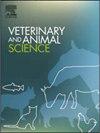Antibiotic use and residue detection in guinea fowl eggs in rural Togo: An assessment of practices and risks
IF 1.9
Q2 AGRICULTURE, DAIRY & ANIMAL SCIENCE
引用次数: 0
Abstract
Various classes of antibiotics are used to treat guinea fowl diseases in rural Togo. The aim of this study was to assess antibiotic treatment practices and detect the presence of antibiotic residues in eggs from guinea fowl farms in the Savannah region of Togo. The study involved direct interviews using a questionnaire administered to 87 farmers in the Oti, Tone and Tandjoare prefectures, using the Kobocollect tool. Qualitative analysis of the presence of antibiotic residues in guinea fowl eggs was carried out using the Premi®Test collected from farmers. Data were presented as relative frequencies using Excel software and logistic regression analysis and Chi-square test were performed to ascertain positive associations. The minority of farmers (1.15 %) were under the care of a veterinarian, while 87.36 % practiced self-medication and did not respect the prescribed doses of antibiotics, and 11.49 % had no supervision. All the farmers surveyed use plants for therapeutic purposes, without any real knowledge of the correct dosage. Additionally, 56.66 % of farmers did not respect the withdrawal period before guinea fowl eggs are consumed or placed on the market. Furthermore, 49.43 % (Chi-square statistic = 14.92; dof = 2; P = 0.00058) of guinea fowl egg samples analyzed contained antibiotic residues. Biosecurity and confinement were positively associated with the presence of antibiotic residues in eggs. The study reveals inappropriate use of antibiotics by guinea fowl farmers in the Savannah region of Togo, leading to the presence of antibiotic residues in the eggs.
多哥农村珍珠鸡鸡蛋抗生素使用和残留检测:做法和风险评估
在多哥农村,使用各种抗生素治疗珍珠鸡病。本研究的目的是评估抗生素治疗做法,并检测多哥萨凡纳地区珍珠鸡养殖场鸡蛋中抗生素残留的存在。该研究使用Kobocollect工具对Oti、Tone和Tandjoare县的87名农民进行了问卷调查,并进行了直接访谈。采用从养殖户收集的Premi®测试方法对珍珠鸡蛋中抗生素残留进行定性分析。使用Excel软件以相对频率表示数据,并进行逻辑回归分析和卡方检验以确定正相关。少数养殖户(1.15%)有兽医照料,87.36%的养殖户自行用药且不遵医嘱给药,11.49%的养殖户没有兽医监督。所有接受调查的农民都将植物用于治疗目的,而不知道正确的剂量。此外,56.66%的农民没有遵守珍珠鸡鸡蛋消费或投放市场前的回收期。49.43%(卡方统计量= 14.92;Dof = 2;P = 0.00058)。生物安全和禁闭与鸡蛋中抗生素残留的存在呈正相关。这项研究揭示了多哥萨凡纳地区的珍珠鸡养殖者不恰当地使用抗生素,导致鸡蛋中存在抗生素残留。
本文章由计算机程序翻译,如有差异,请以英文原文为准。
求助全文
约1分钟内获得全文
求助全文
来源期刊

Veterinary and Animal Science
Veterinary-Veterinary (all)
CiteScore
3.50
自引率
0.00%
发文量
43
审稿时长
47 days
 求助内容:
求助内容: 应助结果提醒方式:
应助结果提醒方式:


